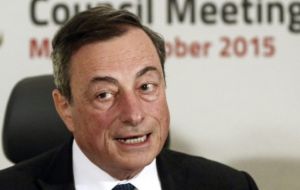MercoPress. South Atlantic News Agency
Concerns over Euro low inflation; ECB plans to re-examine stimulus program
 “The asset-purchase plans are proceeding smoothly and continue to have a favorable impact,” bank head Mario Draghi told a news conference in Malta.
“The asset-purchase plans are proceeding smoothly and continue to have a favorable impact,” bank head Mario Draghi told a news conference in Malta. The European Central Bank (ECB) says it will “re-examine” its €1.1 trillion quantitative easing (QE) stimulus program at its December meeting. It has embarked on a scheme of bond purchases at €60bn per month designed to bring Euro zone inflation back up.
But consumer prices fell by 0.1% in the Euro area in September, prompting speculation there may be changes to the bank's QE policy. The comments came as the bank left its key interest rate unchanged at 0.05%.
“The asset-purchase plans are proceeding smoothly and continue to have a favorable impact,” bank head Mario Draghi told a news conference in Malta.
“The degree of monetary policy accommodation will need to be re-examined at our December meeting.”
The decision to leave the cost of borrowing unchanged was widely expected after the ECB cut rates to rock-bottom levels more than a year ago. It kept the rate on bank overnight deposits at -0.2%, which means banks pay to keep funds at the central bank.
The ECB also held its marginal lending facility - or emergency overnight borrowing rate for banks - at 0.3%.
Draghi added that the bank's governing council had taken part in “a very rich discussion” on a number of areas of monetary policy, including a potential further cut in the rate charged to banks to leave money on deposit at the central bank.
Meanwhile, Howard Archer, chief European and UK economist at IHS Global Insight, said the ECB also seemed to have indicated that it was open to a “whole menu” of monetary policy instruments.
“Significantly, interest rate cuts now appear to be back on the table, having seemingly been off the agenda since September 2014,” he added.
Draghi also said that the Euro zone inflation rate was set to remain very low in the near-term.
“Since our last meeting, short-term inflation expectations have declined but more medium to long-term inflation expectations, after some decline following our last meeting, have now recovered and are basically unchanged since then,” he said.




Top Comments
Disclaimer & comment rulesCommenting for this story is now closed.
If you have a Facebook account, become a fan and comment on our Facebook Page!